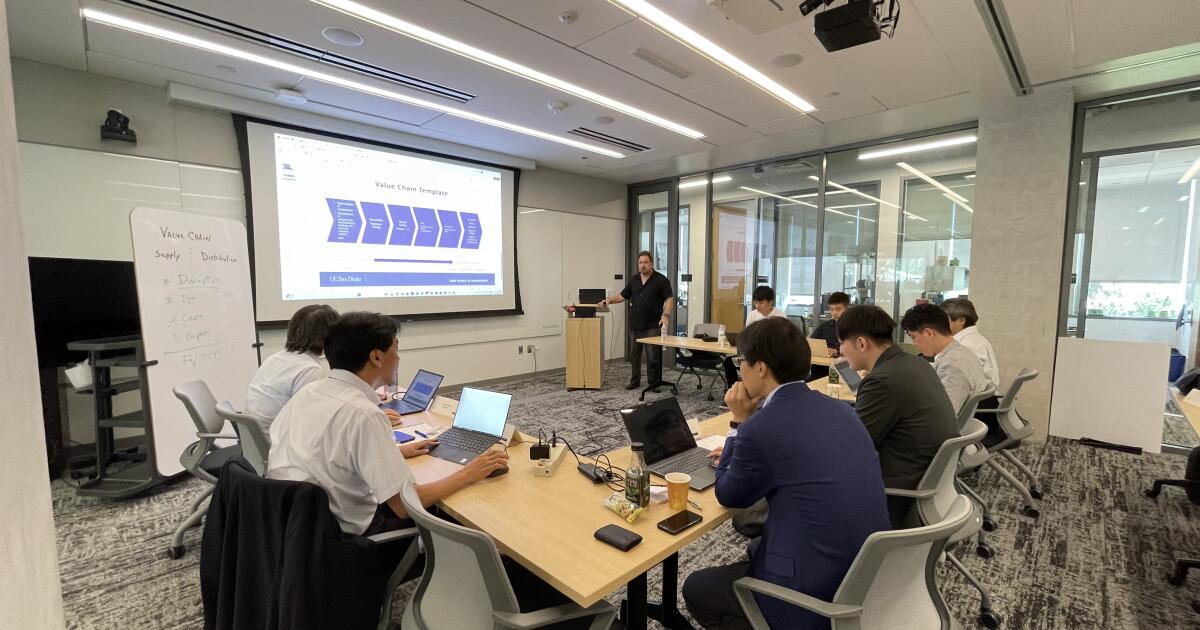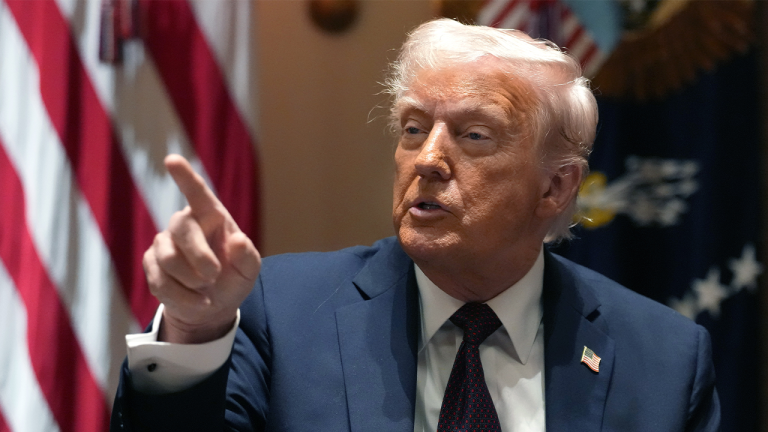
For 19 years, Takehito Matsuba worked for two big corporations in Tokyo — Mitsubishi and Google.
Like so many others, he reached an inflection point during the pandemic. Tired of working for big organizations, he thought “life is short” and left to join a life science startup called Citadel AI, which checks the reliability of artificial intelligence applications for making medical diagnoses.
That decision two years ago is what led him overseas to experience an intensive crash course in what it takes to grow a biotech company in the United States.
Citadel AI was one of seven Japan-based startups that came to UC San Diego, where they spent weeks learning from local entrepreneurs, refining their pitches and networking with venture capital firms.
San Diego was one of three U.S. cities chosen by the Japanese government to host a new program called Beyond Japan. Other Japanese startups participated in Los Angeles and Austin, Texas.
It’s part of Japan’s five-year plan to increase investments in startups by tenfold, or $72 billion. That ambitious goal includes creating 100 unicorns — privately held startup companies valued at more than $1 billion — and birthing 100,000 Japanese startups.
While Japan is recognized for its cutting-edge technology, the startup scene is still relatively young and has room to grow. That’s where this multi-year partnership with UC San Diego’s Institute for the Global Entrepreneur comes in.
This summer, the university worked with 35 Japanese startups virtually, paired them with mentors, then selected seven to travel to the U.S. for an in-person experience. Matsuba’s mentor was Robert Hill, who recently retired after working 32 years globally for Deloitte Consulting.
Yoshiko Tsuwaki, the executive director of Japan’s External Trade Organization who helped spearhead the Beyond Japan program, said the group chose specific focuses for each host city instead of sending startups to Silicon Valley. As one of the country’s top life-science hubs, San Diego hosted startups focused on biotech, medical devices and other life-science applications.
“When it comes to the startups in United States, people in Japan think about only Silicon Valley, not the other cities, so I want to change that perception,” she said.
Dennis Abremski, executive director of the Institute for the Global Entrepreneur, said Silicon Valley is all about venture capital dollars, but San Diego’s strength is its wealth of life-science knowledge. The new program allowed UCSD to build on past exchanges it’s had with Japanese universities.
Instead of having the teams parachute into San Diego and pitch their company, Abremski said UCSD spent a lot of time beforehand on Zoom prepping the young life-science companies. It also helped create individualized support for each company’s goals.
“Once they get here, we do a lot of concept work on how entrepreneurs think in the United States and especially the medical system; how the FDA works, how the healthcare system works, how it’s different than Japan and other parts of the world,” he said.

Representatives from Japanese startups pose for a photo at UC San Diego with Dennis Abremski (center-left) executive director of the Institute for the Global Entrepreneur and Albert Pisano (center-right) dean of the Jacobs School of Engineering.
(Courtesy of UC San Diego /Tomomi Kurosu)
The government’s recent push to expand Japanese startups stems from more interest from global investors, Tsuwaki explained, and “at the same time, Japanese startups realized the domestic market is too small and they want to go abroad. But they don’t have any experience to expand their business abroad.”
One of the big hurdles for Japanese startups looking to break out globally is the language barrier. The program at UC San Diego addressed this by conducting all sessions — some running from 9 a.m. to 6 p.m. — only in English.
Yoji Otsuki, an executive at CubicStars, also noted the different communication style in the United States. The group spent four hours at Innovation Day, an annual event at Petco Park that shows off San Diego’s startup community. Rather than sitting behind the table waiting for customers as they typically would, Japanese executives were encouraged to stand in front and just pitch.
Otsuki’s company developed technology that allows researchers to examine three-dimensional images of organs, such as the brain, and track how efficiently a drug travels through the system. The Tokyo-based startup was founded in 2019 and has contracts with seven out of 10 top Japanese pharmaceutical companies.
While Otsuki speaks three languages and has 12 years of management experience for Panasonic and a consulting firm, he said the immersive experience and professional networking he did in San Diego was unlike anything he’s done before.
From conversations with industry lawyers to having a one-on-one meeting with a Bay Area venture capitalist, he said “that is kind of an impossible opportunity if I was in Japan.”
Joon Paek, chief operating officer of Abrax Japan, was taken aback by the willingness of mentors to spend time answering questions and trying to help their business grow.

Joon Paek, chief operating officer of Abrax Japan, gives a presentation during the Beyond Japan program at Procopio Law Firm.
(Courtesy of UC San Diego /Tomomi Kurosu)
Paek’s biotech company is developing a topical product, based on the potential use of an immune modulating protein called thymic stromal lymphopoietin, to treat eczema, dry eye disease, obesity and obesity-related metabolic complications. One of the company’s goals is to open operations in the U.S.
“The culture here is very different,” Paek said. “I’ll say, Bay Area is more cutthroat and competition. But here is more like collaboration and cooperation. Those two c’s are very, very different connotations.”
Paek grew up in the United States and has decades of global business experience, including working for a venture capital firm before joining Abrax Japan. One of the challenges to catalyzing more startup activity in Japan traces back to traditional mentalities about taking risk in business.
Many young people opt for stable jobs at large corporations after university. Venture capital firms aren’t as common as large institutional financial firms, so investors tend to be risk-averse.
“Here in the states, we often say fail early, fail often, right? But that’s, like, completely opposite of the Japanese culture and like, they don’t want to fail,” he said.
However, that mentality about sticking with one job is slowly changing, Paek said.





